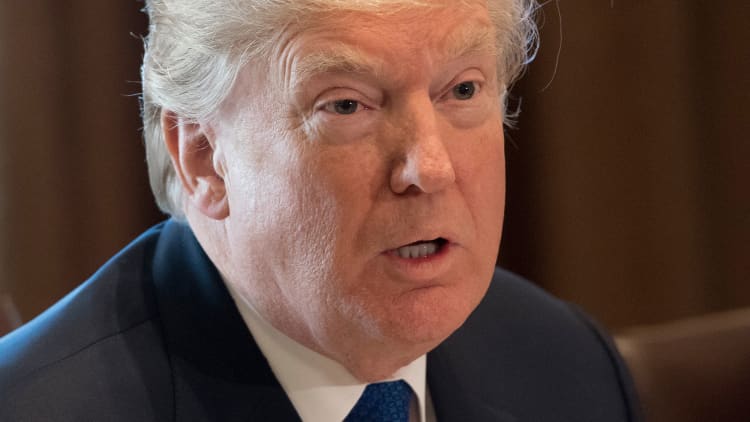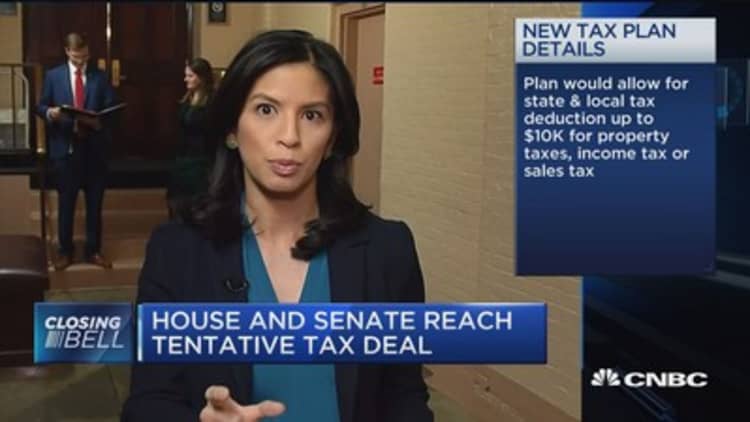
House and Senate negotiators have reached a deal on a tax plan, moving the GOP one step closer to its goal of passing a sweeping tax overhaul this year, Senate Finance Committee Chairman Orrin Hatch said Wednesday.
The two chambers hope to pass a joint plan and send it to President Donald Trump's desk before Christmas. Republican leaders have scrambled to push through major tax changes and earn a legislative win ahead of next year's midterm elections.
"I think we have a deal," Hatch, a Utah Republican, told reporters without going into more detail about what it would include. He said he believes Republicans have the votes to pass it.
A White House source separately confirmed to CNBC that a tax deal is in place. Republicans aim to vote first in the Senate, then the House and pass it next week.
"We're very, very close to a historic legislative victory the likes of which rarely this country has ever seen," Trump told reporters at a lunch with Republican members of the conference committee negotiating the bill. He added that the GOP is "very close" to voting.
Two crucial GOP senators — Ron Johnson of Wisconsin and Susan Collins of Maine — said they would reserve judgment on the bill until they see the final text.
The Republican deal features a 21 percent corporate tax rate, starting in 2018, and a top individual rate of 37 percent, CNBC and other outlets reported. It would also allow a mortgage interest deduction on loans up to $750,000.
The corporate alternative minimum tax — which the Senate included in its bill but House leaders vehemently opposed — will not be included in the plan, two sources told CNBC.
Trump said Wednesday he would sign a bill that includes a 21 percent corporate tax rate. The White House repeatedly said it wanted a 20 percent rate. However, he cautioned that the corporate rate was not final.
"It's at 35 right now. So if it got down to 21, I would certainly be — I would be thrilled. ... We haven't set that final figure yet, but certainly 21 is a very great difference," Trump said.
It is unclear if the final bill would expand state and local tax deductions beyond the limited $10,000 in property tax deductions proposed in the separate bills already passed by the House and Senate.
The agreement came even before the House and Senate conferees working on a final tax deal held an open meeting later Wednesday. Heading into that meeting, House Ways and Means Committee Chairman Rep. Kevin Brady, R-Texas, said "it feels very close" to an agreement.
Democrats in the conference meeting quickly slammed the event, saying the decisions on the tax proposal had already been made.
"This is an obvious attempt to lend credibility to a baseless Republican talking point about following regular order. Nobody ought to mistake this conference for regular debate," said Sen. Ron Wyden, D-Ore., ranking member of the Senate Finance Committee.
Sen. Bernie Sanders, I-Vt., called the meeting a "farce."
Trump is slated to make additional remarks on the tax bill later in the day.
The Republican proposal chops tax rates for businesses and at least temporarily trims the tax burden on individuals. It changes numerous deductions and tax breaks and is expected to add $1 trillion or more to federal budget deficits over a decade, according to congressional estimates.
Democrats argue that the plan does too much to help wealthy individuals and corporations and does not provide enough relief for the middle class.
Earlier Wednesday, Senate Minority Leader Chuck Schumer, D-N.Y., urged Republicans to delay voting on the tax bill until Alabama Democrat Doug Jones is sworn into the Senate. Jones is projected to win Tuesday's special election for the Senate seat vacated by Attorney General Jeff Sessions.
Schumer called it "wrong for Senate Republicans to try to jam through this tax bill" before Jones can vote. Republicans have talked for months about passing a tax plan before the end of the year and appear unlikely to delay.
Once made official, Jones' victory would reduce the Republicans' edge in the Senate to 51-49 seats.
Trump said Wednesday that it was "important" to vote on the tax bill next week, but not only because the GOP lost a seat in Alabama.
— CNBC's Ylan Mui and Eamon Javers contributed to this report.
WATCH: House and Senate reach tentative tax deal




